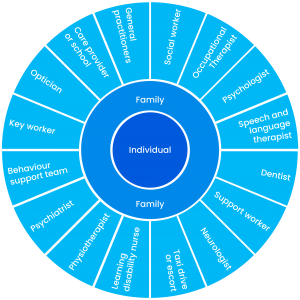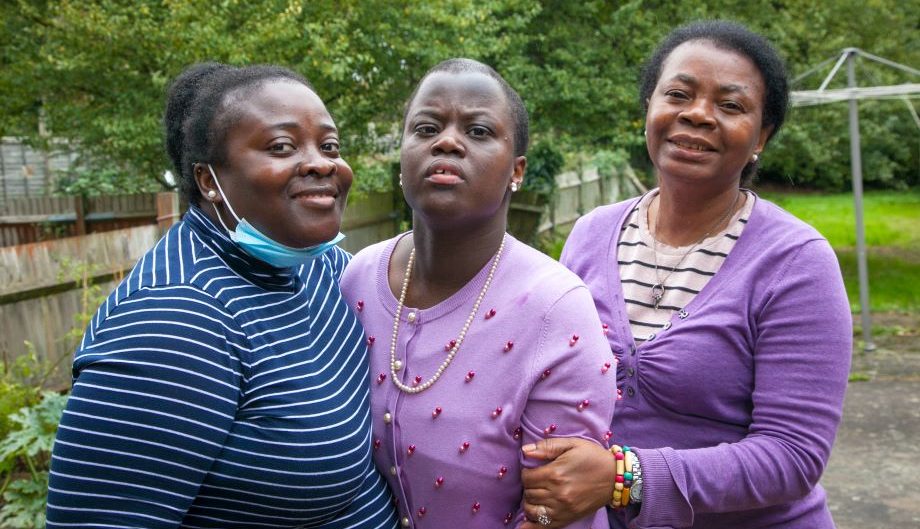Barriers to Partnership Working
I fully understand the frustration families feel when dealing with professionals; our seeming inability to listen, our defensiveness at being challenged and our tedious obsession with our own systems comes across to families as a fundamental lack of humility and respect. Partnership working means being more person-centred and ultimately making better decisions but it also means professionals behaving better. Managing Director of a large support provider
What are the barriers to good partnership working?
Families may have had different experiences of support from a range of professionals, varying from extremely positive and supportive to poor quality and difficult to manage. Families who have contacted the CBF report:
- Having to fight to access services
- Being excluded from what is available, e.g. short break services
- Services being inflexible to the needs of families
- A ‘crisis management’ approach
- Ineffective support for people with challenging behaviour
- Being labelled as obstructive when questioning professional opinion
It feels as though I have been thrown off a cliff into deep water and I don’t know how to swim. All around me there are people who can help me, or teach me, to swim. But I can’t get to them and they don’t help me, and I know that eventually I will go under. Family Carer
These factors can leave families feeling unsupported and can have a profound impact on the family’s quality of life and feelings of isolation. Being aware of the difficulties that families experience when trying to access support is key to empathising with their circumstances and making adjustments to the way you work.
Of course, for professionals there are many factors that may create barriers to working well with families, including:
- Limited resources
- Heavy caseloads
- Lack of appropriate local services
- Time constraints
- Mistrust from families
- Limited access to training
Family carers may not appreciate how little time professionals have to dedicate to each individual or family they work with and may not be aware of the challenges and competing demands each professional faces in their job.
Successful Partnership Working
How can we overcome barriers to work in partnership?
- Honest and open communication
- Accept the challenges each other faces
- Acknowledge each other’s expertise
- Provide accessible information (jargon free etc.)
- Consider the family’s other commitments when arranging meetings and adjust the time, date and venue accordingly
- Respect individual family differences (e.g. culture)
- Include family carers/relatives in training
- Keep communication channels open, even if you disagree
Parents are often, and with some reason, sceptical at the very least of professionals who come into their homes and seem to tell them what they should be doing, especially around challenging behaviour. A good professional listens first and builds up trust by supporting the family to make informed decisions and giving them time and space to consider their options. Trust is important as I need the family to share with me as much information as is relevant to ensuring I give them the right support and service. For me the more I know about the family, their needs and wishes, the better placed I am to provide the right advice and guidance. Independent support broker
By improving partnership working you can achieve greater equality, mutual respect and satisfaction, as well as more efficient use of everyone’s time. You can create a positive, empowering and supportive relationship with everyone working together towards the same goals. Most importantly you should achieve better outcomes for the person with learning disability and challenging behaviour.
Working in Partnership
In order to achieve the best possible outcomes for the person in your care, building good relationships with family carers is vital. The Challenging Behaviour Foundation’s founding principle is family carers and professionals working together as equal partners, with both being viewed as experts.
The role of family carers
Families are usually the main source of love, care and support for children and adults with learning disabilities. This is especially the case for people with complex needs… Families continue to offer a lifetime of involvement, support and advocacy. (Valuing People Now, 2009)
Family carers are powerful advocates for their family member and understand their needs better than anyone, so supporting them through good information and shared goals helps them to advocate effectively for their family member. Families are diverse – their individual circumstances vary enormously, so understanding each family context is essential to offering appropriate support.
Professional involvement
You will not be the only professional working with the individual:

The professional input around someone with a learning disability and their family is wide-ranging and changes over time. Families have to deal with the interactions between all this support and manage communications with everyone. When new professionals become involved, family carers hope they will be person and family centred, compassionate, knowledgeable and supportive.

